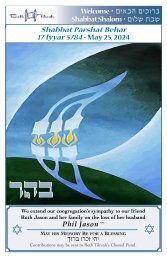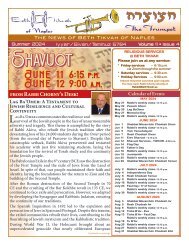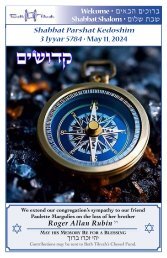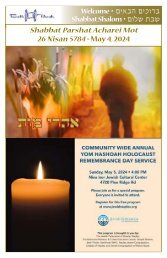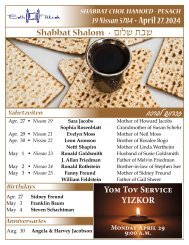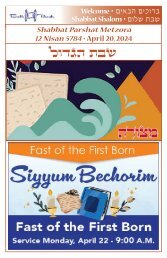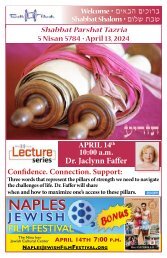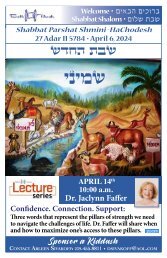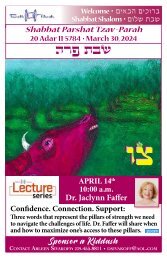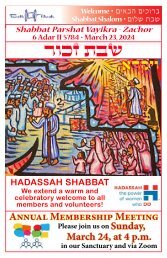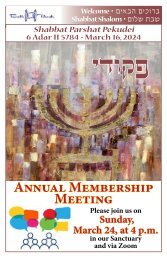You also want an ePaper? Increase the reach of your titles
YUMPU automatically turns print PDFs into web optimized ePapers that Google loves.
Welcome • ohtcv ohfurc<br />
Shabbat Shalom • ouka ,ca<br />
Shabbat Parshat <strong>Emor</strong><br />
10 Iyyar 5784 • May 18, 2024<br />
rnt<br />
ברוך הבא<br />
Welcome to Beth Tikvah<br />
Rabbi Daniel Chorny
Yahrtzeiten<br />
May 17<br />
May 20<br />
May 22<br />
Carol Mest<br />
Sam Geist<br />
Delaney Fox<br />
vfrck oburfz<br />
May 18 • 10 Iyyar Benjamin Bennett – Father of Jonathan Bennett<br />
Sally Green – Mother of Judith Chaloff<br />
Barney Applebaum – Father of Heidi Gilbert<br />
May 19 • 11 Iyyar Morton Macks – Father of Lawrence Macks<br />
Harry Hoffman – Father of Marcia Danoff<br />
Miriam Barber – Mother of Martin Barber<br />
May 20 • 12 Iyyar Rose Goldenberg – Sister of Alan Rosenberg<br />
May 22 • 14 Iyyar Edythe W. Cohodes – Mother of Marcia Cohodes<br />
Kathleen Frank – Sister of Lee Henson<br />
Harold Isenberg – Father of Shelley Goodman<br />
May 23 • 15 Iyyar Louis Kramer – Father of Nancy Garfinkel<br />
Anna Sivakoff – Mother-in-law of Arleen Sivakoff<br />
May 24 • 16 Iyyar Gerald Cohen – Relative of Janice Chartoff<br />
Oscar Grusky – Father of Fiona Welles<br />
Howard Cohen – Father of Jeanne Kagin<br />
Birthdays<br />
jna `skuv ouh<br />
Shabbat Kiddush Sponsored by:<br />
Harvey Rosenthal<br />
In honor of<br />
Rabbi Chorny<br />
Mavens: Rosalee Bogo<br />
Assisted by: Fran Kaufman,<br />
Shep & Linda Scheinberg and Susan Wasserman<br />
Sponsor a<br />
Kiddush<br />
Contact Arleen Sivakoff:<br />
dsivakoff@aol.com • 239.455.8811
Torah & Haftarah Readings:<br />
Shabbat <strong>Emor</strong>: Leviticus 22:17–23 (Cycle 2) (Etz Hayim p. 722)<br />
1. 22:17-20 2. 22:21-25 3. 22:26-33 4. 23:1-3<br />
5. 23:4-8 6. 23:9-14 7. 23:15- 22 M. 24:21-23 (p. 733)<br />
Haftarah: Ezekiel 44:51–31 (p. 735)<br />
Torah Commentary<br />
D’var Torah:<br />
Reflecting God’s Light - Bex Stern-Rosenblatt<br />
There is a tension running through all of Leviticus, through<br />
all of Torah, through all of life. God in all God’s infinite power<br />
nonetheless is bothering with us humans, playing our little<br />
human games. God is inviting us to bask in the reflection of<br />
God’s holiness, to aspire to be God-like without ever thinking<br />
ourselves gods. God is needing us, or at least wanting us. And<br />
we seem to be uncomfortable with the idea of a God who does.<br />
Our parashah contains a beautiful description of the continual<br />
lighting of the menorah, to burn eternally. The verse is tripping<br />
over itself to emphasize the everlasting nature of this project:<br />
the lamps will burn forever, eternally, for all your generations.<br />
The lamps will burn from evening to morning, just as God<br />
guided us in the wilderness. Over and over again, we read<br />
the word tamid, perpetual, continual, always. It’s a beautiful<br />
concept. Just as God was there for us in the wilderness, now<br />
too, we will always be there for God, lighting the menorah as<br />
long as our descendants survive, which will be forever, so that<br />
they too can keep the menorah lit.<br />
And yet we push back against this idea of being there for God,<br />
of God needing us. Rabbi Shmuel b. Nahmani succinctly<br />
explains (b. Menachot 86b) that the point of lighting was for us and<br />
not for God, as God does not need its light. Rather, the point of<br />
the light was to be a “testimony to all of humanity that<br />
the Divine Presence rests among the Jewish people.”<br />
We do not light for God, we get to light as a gift from God.<br />
Likewise, we read a midrash (Vayikra Rabbah 31:8) in which the<br />
rabbis express a deep discomfort with the idea of God needing<br />
us. They detail the many times that God has brought light to<br />
the world from nothingness, from darkness. We read of the
illiance of lightning, power of sight emerging from the<br />
blackness of the pupil, the formation of light from darkness,<br />
the creation of the fetus in the darkness of the womb. After each<br />
example comes God’s refrain, “Do I need your light?” And yet<br />
this midrash is commenting on our verse in this parashah, this<br />
moment in which we offer God our light. And in response to<br />
each of these queries, Rabbi Acha replies in God’s voice, saying,<br />
“I have commanded (you to light the menorah) in order to<br />
give you merit.” We answer that God does not need our light.<br />
God is allowing us, rather to partake in God’s light.<br />
But there is one more take on this, a beautiful midrash (Vayikra<br />
Rabbah 31:4) recounting a conversation between God and Adam<br />
shortly after the formation of the world, the creation of all that<br />
light. We read that God said to Adam: “Your light is in my<br />
hands and my light is in your hands.” The source text for our<br />
light being in God’s hands is Proverbs 20:27, “The light of<br />
God is the soul of man.” The source text for God’s light being<br />
in our hands is our parashah, “to light a continual light.” We<br />
both hold each other, our souls form God’s light from which<br />
our souls are then formed. So perhaps God does need us to<br />
light the menorah. Perhaps God’s eternal light is dependent on<br />
our eternal lighting. Let us not be the ones who let it go out.<br />
✺ Join Rabbi Chorny<br />
for his weekly discussion<br />
group, Tuesdays at<br />
12:15 p.m. via<br />
and IN Person<br />
Beth Tikvah of Naples<br />
1459 Pine Ridge Road<br />
Naples, FL 34109<br />
239 434-1818<br />
Visit us online at<br />
bethtikvahnaples.org<br />
or scan the QR code







